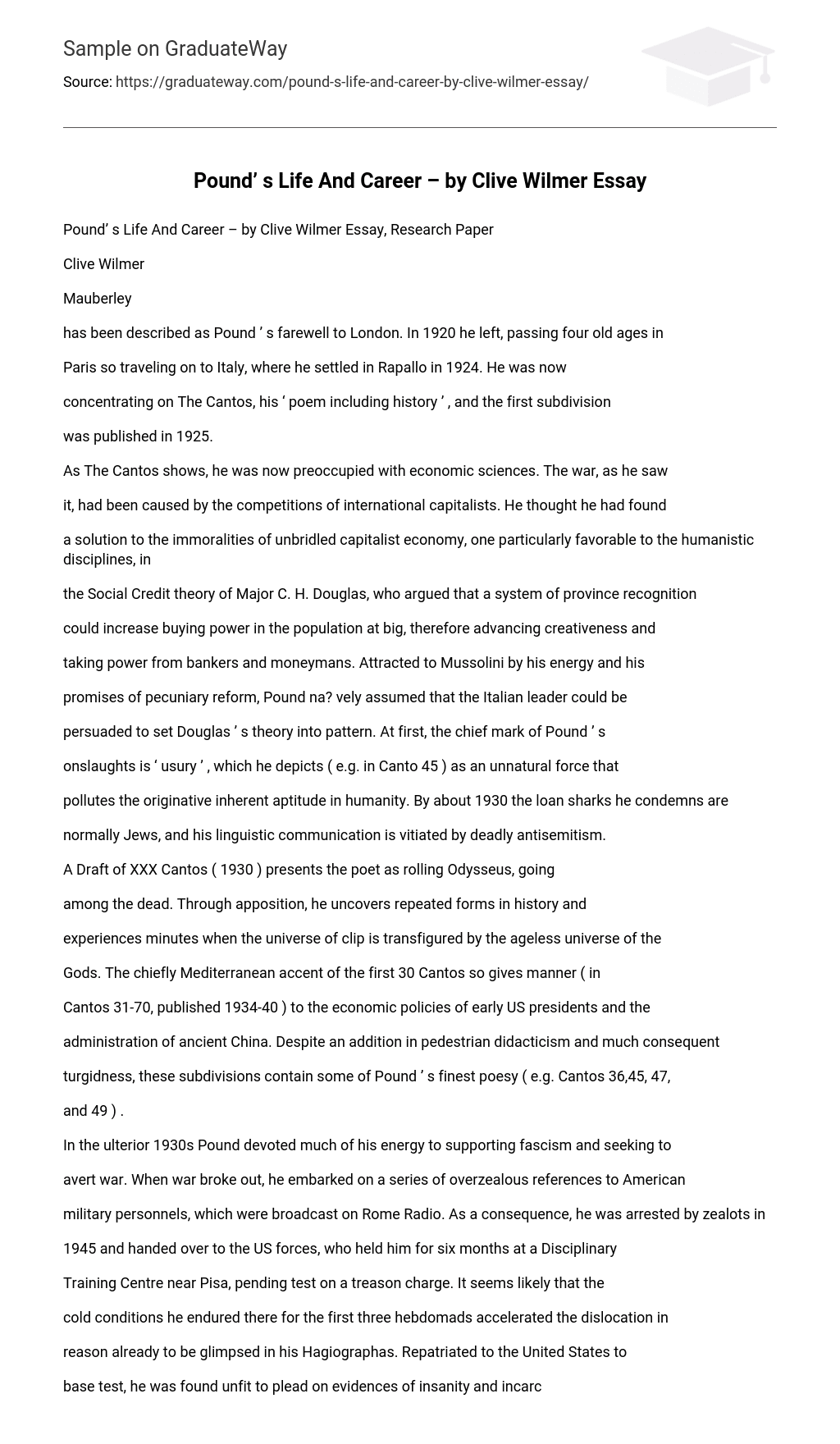Mauberley has been described as Pound ’ s farewell to London. In 1920 he left, passing four old ages in Paris so traveling on to Italy, where he settled in Rapallo in 1924. He was now concentrating on The Cantos, his ‘ poem including history ’, and the first subdivision were published in 1925.
As The Cantos shows, he was now preoccupied with economic sciences. The war, as he saw it, had been caused by the competitions of international capitalists. He thought he had found a solution to the immoralities of unbridled capitalist economy, one particularly favorable to the humanistic disciplines, in the Social Credit theory of Major C. H. Douglas, who argued that a system of provincially recognition could increase buying power in the population at big, therefore advancing creativeness and taking power from bankers and moneymans. Attracted to Mussolini by his energy and his promises of pecuniary reform, Pound navely assumed that the Italian leader could be persuaded to set Douglas ’ s theory into pattern. At first, the chief mark of Pound’s onslaughts is “usury” , which he depicts (e.g. in Canto 45) as an unnatural force that pollutes the originative inherent aptitude in humanity. By about 1930 the loan sharks he condemns are normally Jews, and his linguistic communication is vitiated by deadly antisemitism.
A Draft of XXX Cantos (1930) presents the poet as rolling Odysseus, going among the dead. Through apposition, he uncovers repeated forms in history and experiences minutes when the universe of the clip is transfigured by the ageless universe of the Gods. The chiefly Mediterranean accent of the first 30 Cantos so gives manner (in Cantos 31-70, published 1934-40) to the economic policies of early US presidents and the administration of ancient China. Despite an addition in pedestrian didacticism and much consequent turgidness, these subdivisions contain some of Pound ’ s finest poesy (e.g. Cantos 36,45, 47, and 49).
In the ulterior 1930s Pound devoted much of his energy to supporting fascism and seeking to avert war. When war broke out, he embarked on a series of overzealous references to American military personnels, which were broadcast on Rome Radio. As a consequence, he was arrested by zealots in 1945 and handed over to the US forces, who held him for six months at a Disciplinary Training Centre near Pisa, pending test on a treason charge. It seems likely that the cold conditions he endured there for the first three hebdomads accelerated the dislocation in reason already to be glimpsed in his Hagiographas. Repatriated to the United States to base test, he was found unfit to plead on evidences of insanity and incarcerated in St. Elizabeths Hospital, Washington DC, from 1946 to 1958. His imprisonment brought about an artistic recovery.
The Pisan Cantos ( 1948 ) , drafted in the DTC, are the most straight personal verse forms he wrote. In hardship, and witting of the calamity of Europe, he contemplates his in yesteryear in that context, particularly the watershed old ages of the modern motion. Suffering and retrospection induce a new humilit Y, exemplified in his attention for the life around him–the insects, the animate beings, the cantonment guards. In St. Elizabeths he completed two instead more deep subdivisions of the verse form – Section: Rock-Drill ( 1955 ) and Thrones ( 1959 ) – every bit good as a programme of interlingual renditions from the Confucian classics.
On his release, he returned to Italy, deceasing in Venice in 1972. Despite minutes of rebelliousness, his last old ages were overshadowed by diffidence and consciousness of his “mistakes and wrecks”. In rare public vocalizations he condemned The Cantos as a failure, a position he seems non systematically to hold held; but the verse form was ne’er completed. In 1969 he concluded its publication with Drafts and Fragments of Cantos CX-CXVII: thirty-two pages of poetry, largely calm, but affecting in its atomization.
Pound was the cardinal figure in the modern motion, personally responsible for the reclamation of English poesy in the 1910s. Yet he remains a controversial figure. His brutal political relations have been damaging to his exalted position of the creative person and civilisation ; he is besides condemned as an? litist, an obscurantist, and a mountebank — a adult male deficient in self-knowledge, with no existent apprehension of the modern universe despite his avant-gardiste posturing. None of these charges rather shakes the substance of his accomplishment, which is basically a affair of proficient achievement to a point where polish of accomplishment becomes a moral quality.
Such is the sensitiveness of his poetry motion that it seems to release independent life and distinctness in his topics, as if it had discovered them by opportunity. This is so whether he seeks to arouse the motion of olive foliages in the air current or the character of a Renaissance condottiere. The same quality lies behind his mastermind for interlingual rendition, an art he has been said to hold invented for our clip: uncannily, he creates a linguistic communication for each writer which registers the farness of the writer from our universe while at the same clip doing his work available to us. If Pound is vague, it is mostly because of his broad frame of mention ; he was besides an pedagogue, who used poesy to present his readers to plants and thoughts he had discovered for himself. It is barely his mistake that his course of study has ne’er been adopted.





